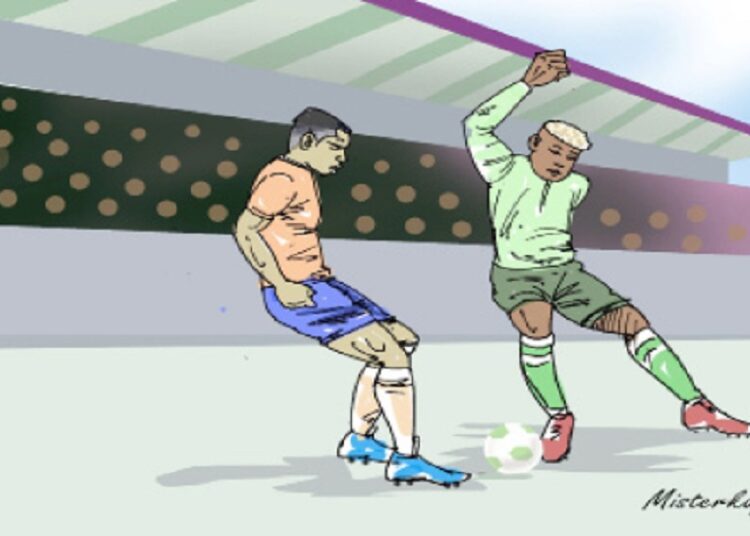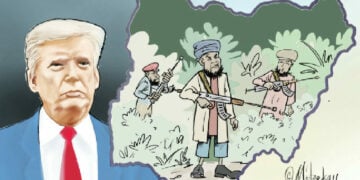In the just concluded African Cup of Nations Championship, the Nigerian national football team, fondly known as the Super Eagles, captivated and held the nation’s attention as they showcased remarkable skill and determination.
The journey to the final was a testament to the unity and patriotism that football has the potential to instill in a nation. Despite the heartbreaking loss in the final match to the host country, Ivory Coast, the impact of the tournament on the spirit of the Nigerian people was undeniable.
Lesson From Super Eagles
Football can be utilized as a tool for promoting and encouraging patriotism, thereby contributing to the enhancement of nation building. Football, as a sport, possesses a unique ability to bring together people from diverse backgrounds, fostering a sense of unity and shared identity.
A roll call of Super Eagles includes Captain Ahmed Musa, Stanley Nwabili, Francis Uzoho, Olorunleke Ojo, Kenneth Omeruo, William Troost-Ekong. Olaoluwa Aina, Oluwasemilogo Ajayi, Calvin Bassey, Zaidu Sanusi, Chidozie Awaziem, Bright Osayi-Samuel, and Bruno Onyemaechi. Others are Alex Iwobi, Raphael Onyedika, Joe Ayodele-Aribo, and Frank Onyeka, Africa Player of the Year Victor Osimhen, Kelechi Iheanacho, Moses Simon, Samuel Chukwueze, Victor Boniface, Sadiq Umar, and Ademola Lookman. These were the best that the country has to offer in every department of the game. And they achieved great results and brought joy to millions of homes across Nigeria. Many have said it and I believe they are right; the day Nigeria State began to choose its political leadership from among the best of us and not from among the worst of us we can begin to achieve results as a nation like the Super Eagles in the field of play. You will notice that there were no complaints even on social media about the fact that most of the players are from the South or that the team has a preponderance of one or two ethnic groups, rather most Nigerians overlooked the primordial divisions with all eyes on victory for the greater glory of our nation. It is a big lesson that the Super Eagles have taught Nigerians especially our leaders that thrive under the cover of ethnic and religious divisions with which they also run to for cover when their mediocre leadership is called to account.
Therefore, the Super Eagles’ journey in the African Cup of Nations Championship exemplifies how a collective pursuit of victory on the field can transcend societal divisions. As the nation rallied behind the team, the tournament became a powerful platform for Nigerians to set aside differences and celebrate a common cause. The intense emotions and fervent support witnessed during the semi-final match against South Africa revealed the deep-rooted patriotism embedded in the hearts of Nigerians. The collective anxiety, the palpable fear of defeat, and the jubilation that followed the victory through a penalty shootout were emblematic of a nation emotionally invested in the success of its football team. However, the tragic loss of five prominent Nigerians due to apparent heart attacks during this period underscored the profound impact of football on the emotional well-being of the populace.
Football And Patriotism
While football serves as a potent catalyst for patriotism, its influence should extend beyond the confines of the pitch. The challenge is to harness the unity and collective spirit cultivated during football tournaments to foster patriotism in everyday life. This extends to both citizens and leaders, as the responsibility to build a strong and united nation lies with every individual.
One of the ways to take patriotism beyond the football championship is to find a way of integrating civic education into school curricula and public awareness campaigns in order to instill a sense of national pride and responsibility. This is by emphasizing core values such as integrity, unity in diversity, and civic duty can contribute to a more patriotic citizenry. And the state must perform its responsibility to the citizens. You cannot get patriotism from citizens who are being killed without the state protecting them. For instance, in the eight years of former president Muhammadu Buhari over 63,111 were killed according to Nigeria Security Tracker, NST, a project of the Council on Foreign Relations’ Africa Programme. Also, in the last eight months of President Bola Tinubu administration thousands of Nigerians have been killed including the Christmas Eve massacre in Plateau State and the ongoing killings in Agatu communities in Benue State among others. You can’t expect families of those killed due to the failure of the state to protect them to be patriotic. It is therefore imperative that the state performs its duties to the citizens in order to have the patriotism exhibited when Super Eagles play to other areas of our lives as a nation.
Political leaders play a pivotal role in shaping the national narrative. By embodying values such as transparency, accountability, and inclusivity, leaders can inspire citizens to take pride in their country. A leadership that prioritizes the welfare of the people reinforces a sense of belonging and shared destiny.
Encouraging community engagement and volunteerism fosters a spirit of cooperation and collective responsibility. Initiatives that address local challenges and promote unity within communities contribute to the broader goal of nation building. Creating a strong national identity that embraces the rich diversity of Nigeria is essential. Recognizing and celebrating the various ethnic, cultural, and religious components of the nation fosters a sense of inclusivity and belonging among all citizens.
Way Forward
While football is a popular and unifying sport, expanding support for other sports can diversify the avenues through which patriotism is expressed. Success in various sporting disciplines can instill a broader sense of national pride and achievement.
Football, with its unifying power, serves as a potent force for fostering patriotism and promoting nation building. The Super Eagles’ journey in the African Cup of Nations Championship exemplified the capacity of the sport to transcend societal divisions and ignite a collective spirit. However, for patriotism to thrive beyond the football pitch, concerted efforts are required from both citizens and leaders.
The tragic incidents of individuals losing their lives in apparent heart attacks during the tournament underscore the need for a more balanced and sustainable approach to patriotism. It is not only about the fleeting moments of victory or defeat in a football match but about cultivating a sense of belonging, shared values, and collective responsibility that endure beyond the final whistle. By harnessing the lessons learned from football and extending them to everyday life, Nigeria can build a stronger, more united nation that stands resilient in the face of challenges and celebrates the diversity that defines its identity. Football, when integrated thoughtfully into the fabric of society, becomes a powerful tool for shaping a brighter future for the nation and its people.
MAY NIGERIA REBOUND





